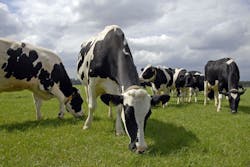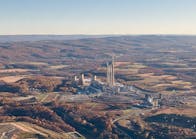Holy cow: Dairy industry enhancing Energy Efficiency, gains in Emissions Reduction
A group representing a large segment of the industry has announced the progress of its global Pathways to Dairy Net Zero (P2DNZ) climate initiative during the recent COP 27 environmental summit in Egypt.
The P2DNZ is backed by more than 140 organizations and governments, including 10 of the largest dairy companies in the world. The supporters represent over 40% of the global dairy production.
Research was commissioned as part of this initiative and led by the Global Research Alliance on Agricultural Greenhouse Gases (GRA) and the UN Food and Agriculture Organization (FAO).
The research found that as dairy companies worldwide are reducing their impact on the environment by improving farming practices and production techniques and developing new technologies, the sector’s emissions intensity has declined by 11% between 2005 and 2015.
The efficiency of dairy farming has improved and resulted in a decline in emissions intensities per unit of product. This is especially seen in developed dairy markets, where emission intensities declined to between 1.3 to 1.4 kg CO₂ equivalent kg fat-and-protein corrected milk. In developing regions, emission intensities range between 4.1 to 6.7 kg.
Many of the best practices identified for this sector are already being implemented in emerging dairy countries, where about 80% of the dairy sector’s emissions are generated. The global dairy sector, the Global Methane Pledge, FAO and others have invited ten developing dairy countries to join P2DNZ. These countries, include Tanzania, Kenya, Rwanda, Uganda, Uruguay, Costa Rica, Colombia, Pakistan, Vietnam and India that collectively represent over 30% of the sectors GHG emissions.
Global Power Markets Outlook: The Energy Transition Gathers Pace
Download Research on key trends by Wood Mackenzie Power & Renewables
The research also identified six primary dairy production systems which can be the focus for emissions reduction. The six production systems include high-input, high-output, medium-scale specialized, pasture-fed, smallholder specialized, smallholder dual-purpose and pastoral and agropastoral.
The researchers are also modelling the impact of emissions on warming.
Partners on the Pathways to Net Zero advocacy group include Global Dairy Platform, International Dairy Federation, Sustainable Agriculture Initiative Platform, International Livestock Research Institute, Dairy Sustainability Framework and IFCN Dairy Research Network.
Among the dairy industry entities involved in the Global Dairy Platform project include members of companies such as Land O’ Lakes, Arla Foods, LePrino Foods and Dairy Farms of America, among others.
The agricultural industry generates vast amounts of methane gas, which is considered many times more detrimental to the environment than carbon dioxide.





